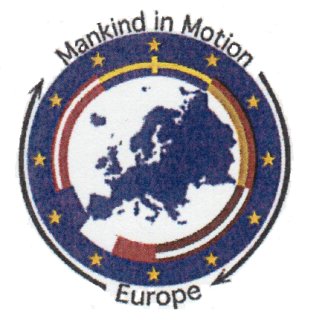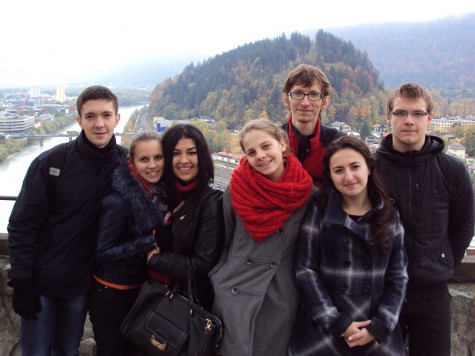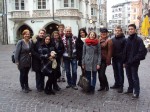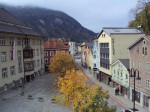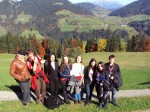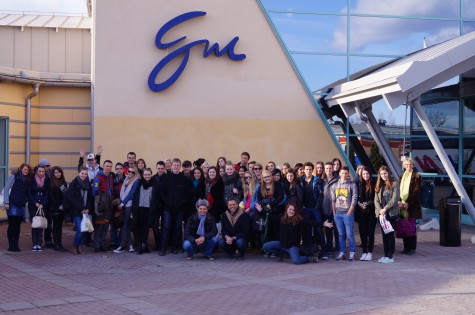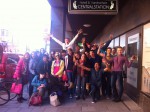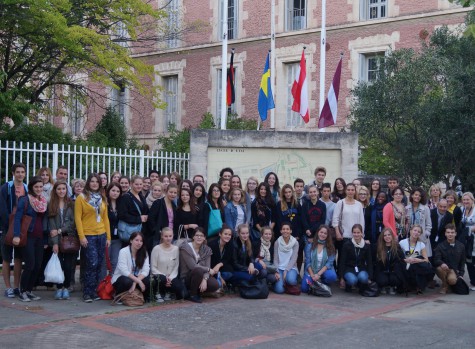Mankind in Motion – Challenges and Opportunities
Five schools in Austria, Germany, France, Latvia and Sweden have joined forces in the project : “Mankind in Motion – Challenges and Opportunities”.
ABOUT THE PROJECT
Mankind is always in motion – that’s one of his first stunning impressions, when the “Little Prince” in Saint-Exupéry’s famous fairy tale (1943) is approaching the Planet Earth during his travel through the universe. Humans are quite bizarre, he says, when watching millions of humans moving around like ants, continuously and hectically….
Indeed, all over the history and until nowadays, people have always been changing their places of living. Their motives are very diverse: search for better climatic, living and working conditions, desire of conquest, escape from political or religous prosecution, cultural interests and curiosity or just a desire to change the way of life.
That is why migration is a very topical issue nowadays. Moreover, it is also an important issue in the school curricula of the project partners, appearing in subjects such as geography, history, sociology and literature.
This project aims at making students aware that there are various forms and motives of human mobilities and that motion is a significant part of everybody’s life. People are often motivated by the wish to improve or simply change their living conditions. Therefore, mobility and migration must be considered as a vital necessity.
In mass media, migration is often reduced to the aspect of massive social migration from poor countries to the rich ones, getting a biased or even negative connotation. Our project aims to demonstrate a much broader picture of the issue, concentrating on the positive impacts of migration and freedom of movement.
Migration has become an increasingly topical issue for Latvia, especially for young people who want to use the opportunity to work and study abroad. We aim to help them to see migration from different points of view, approaching this question in a wise and mature way. Our purpose is to investigate the current situation, develop realistic recommendations for existing and potential immigrants, and possibly make a forecast concerning immigration, using statistics and information about general economic trends. Riga Classical Gymnasium can be named among the largest multicultural schools in Latvia, inspiring its students not only to achieve the best results in their studies but also to become multilingual, tolerant and cosmopolitan citizens of the European Union. Therefore, the possibility to host foreign students and to be a guest in another student’s family abroad is a great life experience allowing students to broaden their horizons, get a lot of new friends abroad and improve foreign language skills.
Thinking about the year 2014, when Riga will be announced the European Capital City, inviting tourists from all over Europe, our school aims to promote and develop closer contacts with other European countries, concentrating on intercultural issues and developing tourism in Latvia.
PROJECT TASKS AND MEETINGS:
1. Comenius meeting in AUSTRIA (20-26.10.2012.) – students had to conduct a research about historical aspects of migration and to discover and investigate some famous migrants’ life stories in each of the five partner countries.
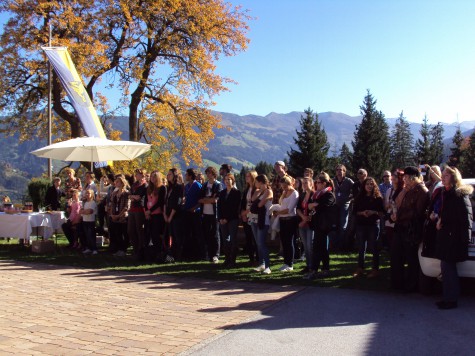 Step 1 : Migrants’ life stories and history of migration : – Clarification of the terms “migration” and “mobility” and its various motives (“push and pull factors”) and forms ( permanent, temporary, circular ) – Short historical overview of migration in the 5 partner countries. – Study of migrants’ life stories in past and present (preferably by examples taken from the 5 partner countries)
Step 1 : Migrants’ life stories and history of migration : – Clarification of the terms “migration” and “mobility” and its various motives (“push and pull factors”) and forms ( permanent, temporary, circular ) – Short historical overview of migration in the 5 partner countries. – Study of migrants’ life stories in past and present (preferably by examples taken from the 5 partner countries)
Comenius group students: Evgeny Bodrenko, Ludmila Cernobajeva, Mansura Aslanova, Olga Sinenkova, Saimat Lachinova, Andrejs Pastuhovs
Our products: Video, project LOGO, glossary of terms, Power Point Presentations, students’ diaries.
Photo gallery:
2. Comenius meeting in SWEDEN (7-11.04.2013) – using statistics and analysing the current legislation issues, students undertook comparative research analyses about the actual situation of migrants in their countries, especially focusing on political and social aspects of migration.
Step 2 : Comparision of migrational politics and impacts of migration :
- Migrational policies, practices and experiences in different countries
- Living conditions of migrants in different countries
- Migration and its impacts for the migrants: Segregation – Integration – Assimilation
- Migration and its impacts for the “host country and society” : Xenophobia – Scepticism – Indifference – Hospitality
Comenius group Sweden: Artem Kheylik, Grigorijs Skulteckis, Dmitrijs Bodrovs, Julija Dabolina, Anna Konovalova, Alicija Nozdrina-Plotnicka, Kristina Sablina, Artis Arturs Silins.
Our products: Video interview, Questionnaires and statistics
Photo gallery:
3. Comenius meeting in FRANCE (13-17.10.2013) – the conference was dedicated to tourism as a special form of migration and its influence on the economic, political and cultural spheres of life in each country.
Step 3 : Tourism as a form of migration(circular/temporary movement)
- Motives and forms of tourism
- Impacts of tourism for the countries of destination and for the travellers’ minds
- Does tourism lead to more xenophobia and prejudices or to more tolerance ?
- Reflection on terms like “home country” and “cultural identity”
Comenius group France: Arturs Kirjanovs, Ivans Lihacovs, Svetlana Licova, Elisa Astrida Munjosa, Anastasija Putilo, Kristina Ruslanova
Our products: Video, Power Point Presentations, booklet.
Photo gallery:
4. Comenius meeting in LATVIA (6-9.04.2014.) – students had to elaborate a detailed plan for a long-term stay abroad and reflect the expectations and fears before starting, as well as the impacts that such experiences abroad inducts for the development of individual and collective mentalities and for the future of a peaceful and united Europe .
Step 4 : Self-experience : Planning a longterm individual stay in a foreign country
- preparations to be considered, formal requirements and things to bring with
- preparation to the differences in mentality and cultural habits
- expectations concerning the benefits of such a stay
Gallery yet to be added.
